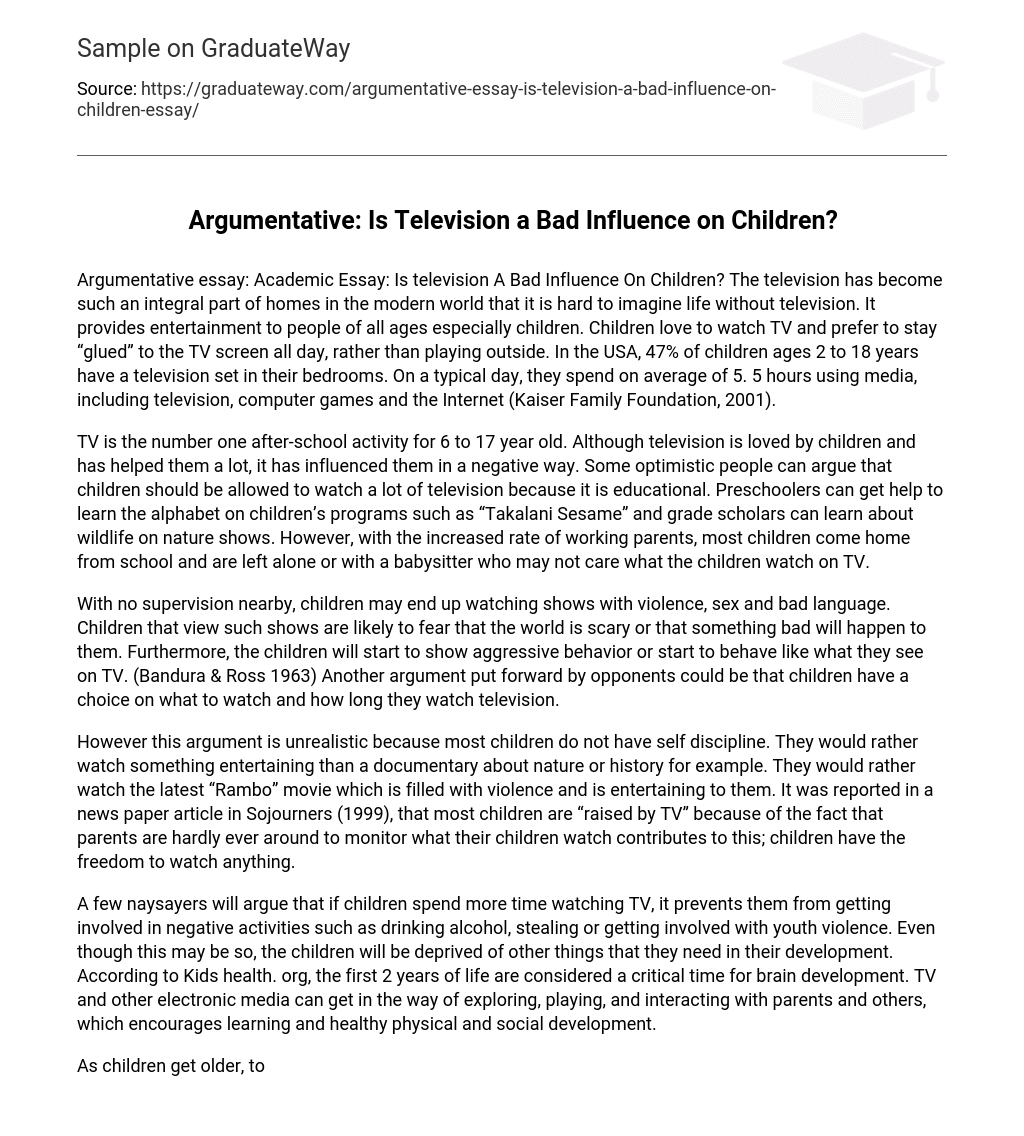Argumentative essay: Academic Essay: Is television A Bad Influence On Children? The television has become such an integral part of homes in the modern world that it is hard to imagine life without television. It provides entertainment to people of all ages especially children. Children love to watch TV and prefer to stay “glued” to the TV screen all day, rather than playing outside. In the USA, 47% of children ages 2 to 18 years have a television set in their bedrooms. On a typical day, they spend on average of 5. 5 hours using media, including television, computer games and the Internet (Kaiser Family Foundation, 2001).
TV is the number one after-school activity for 6 to 17 year old. Although television is loved by children and has helped them a lot, it has influenced them in a negative way. Some optimistic people can argue that children should be allowed to watch a lot of television because it is educational. Preschoolers can get help to learn the alphabet on children’s programs such as “Takalani Sesame” and grade scholars can learn about wildlife on nature shows. However, with the increased rate of working parents, most children come home from school and are left alone or with a babysitter who may not care what the children watch on TV.
With no supervision nearby, children may end up watching shows with violence, sex and bad language. Children that view such shows are likely to fear that the world is scary or that something bad will happen to them. Furthermore, the children will start to show aggressive behavior or start to behave like what they see on TV. (Bandura & Ross 1963) Another argument put forward by opponents could be that children have a choice on what to watch and how long they watch television.
However this argument is unrealistic because most children do not have self discipline. They would rather watch something entertaining than a documentary about nature or history for example. They would rather watch the latest “Rambo” movie which is filled with violence and is entertaining to them. It was reported in a news paper article in Sojourners (1999), that most children are “raised by TV” because of the fact that parents are hardly ever around to monitor what their children watch contributes to this; children have the freedom to watch anything.
A few naysayers will argue that if children spend more time watching TV, it prevents them from getting involved in negative activities such as drinking alcohol, stealing or getting involved with youth violence. Even though this may be so, the children will be deprived of other things that they need in their development. According to Kids health. org, the first 2 years of life are considered a critical time for brain development. TV and other electronic media can get in the way of exploring, playing, and interacting with parents and others, which encourages learning and healthy physical and social development.
As children get older, too much screen time can interfere with activities such as reading, social skills, and being physically active. Health experts have long linked excessive TV-watching to obesity, which a significant health problem today. (Buijzen and Valkenburg 2003). While watching TV, children are inactive and tend to snack. They are also bombarded with ads that encourage them to eat unhealthy foods such as potato chips and empty-calorie soft drinks that often become preferred snack foods.
In conclusion, realizing the problem is the first step. Therefore parents must assess their children and how much TV they are watching, and also what kind of shows they watch. There are some measures that parents can take to avoid their children being negatively influenced by television; Limit the number of TV-watching hours: they can stock the room in which they have their TV with plenty of other non-screen entertainment (books, kids’ magazines, toys, puzzles, board games, etc. ) to encourage kids to do something other than watch the tube.
Parents should also set a good example by limiting their own TV viewing. Finally they should try to treat TV as a privilege to be earned — not a right. Establish and enforce family TV viewing rules, such as TV is allowed only after chores and homework are completed. Though TV is a part of every child’s life, it has a bad influence on them and may cause them to behave as they see on TV. Parents should try their best to avoid this from happening.
References
- Buijzen, M. Valkenburg, P. M. 2003) “The unintended effects of television advertising,” Communication Research, 30:1, 483-503
- Bandara, A. Ross, D. Ross, A (1963) “ Imitation of film-mediated aggressive models” Journal of Abnormal and Social Psychology, 66:1, 3-11
- Kaiser Foundation (2001) The role of Media in Childhood Obesity, Kaiser Family Foundation, Menlo Park, CA URL:http://kidshealth. org/kids/positive/tv_affects_child. html# Duncan, D (1999)
- “Raised by TV (influence of television on children)” Sojourners, September 1, Collum





